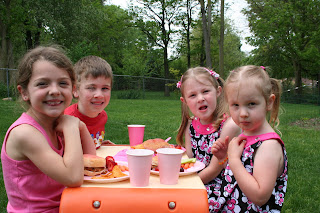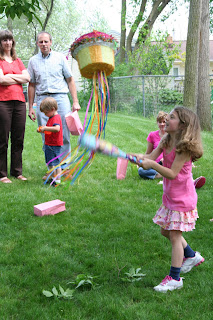I AM a middle-born child. I have an older sister and a younger brother which places me as the middle-born in the birth order of our family. Since the day Dr. Kevin Lehman's book entered our home, it has been the standing "soap box" for this middle-born child. The middle-born syndrome has been a sort of running joke and/or conversational piece among my family however, many points are very true. On one of my journeys surfing the
internet I found the following article. Sorry I can not give credit to the author because I'm not sure where I found it. I wanted to share some positive traits middle-born children offer our communities as adults to those other middle-born children who are in search for significance or those first-born/babies who forgot (or still wonder why) they have a middle-born sibling.
In Dr. Kevin Lehman's "The Birth Order Book," he describes a grown middle-child lamenting his position in the family, describing himself as having been born too late and too soon. As an adult, you might still hear your parents telling you that you were too young to do what your older sibling did and too old to act like your younger sibling. Even so, it might come as a surprise to learn that the challenges you faced as a youngster might help prepare you for life as an adult.
According to Lehman, the middle child's middle-born child struggles for recognition but might grow stronger as a result. According to Lehman, the middle child's birth order deprives him of the special distinction afforded his older and younger sibling. If you are a middle child, your position in the family might have caused you to feel excluded from the family spotlight and might have left you competing for your parents' attention. Children born between the first child and the last struggle for recognition and respect from their families.
An adult middle-born often has impressive social skills. After growing up in the middle, you might see yourself developing into an adult whose background in the middle prepared you for reality; as a result, you might work harder for recognition while making fewer demands from others along the way. Lehman's research suggests that middle-born children often evolve into resourceful, tenacious adults capable of turning obstacles into opportunities. You might see yourself reflected in Lehman's depiction of a middle child whose background prepared him for life and gave him the tools needed to compromise, empathize and share.
Familiar with "give and take," the middle-born might become a balanced adult. Lehman's research indicates that because of an
adult's experience as a middle child, he might empathize with victims of injustice. Sometimes, however, the grown-up middle child's capacity to endure unfair treatment compels others to take advantage of him. If you grew up in the middle, you might relate to the simple explanation given by Jane, a grown middle-child, when asked why she accepted her spouse's mistreatment. "It's not so bad," she said, "I can handle it" .
An adult middle-born may put a great deal of effort into making relationships work. When you reach adulthood, you might resist sharing your thoughts and feelings with others, including your mate. This cautious, reserved behavior might carry over from childhood, when you might have felt excluded from the secure family circle. However, as an adult, your appreciation for being included and accepted might impel you to nurture your relationships and to stay faithful to your spouse or partner .
Your skills and strengths as a middle child might serve you well in the adult world. Once they become adults, Lehman advises middle-born children not to under-sell themselves by comparing themselves to their older siblings or to others. As adults, middle-born children often possess excellent managerial skills and leadership qualities. If you receive an offer to take a job in management or in some other leadership position, don't turn it down, thinking you lack the qualities necessary to do the job. Lehman recommends going for it, using your natural middle-child skills and strengths to your advantage.
 Rhianna's choice for the theme of her 7th birthday party was Pinkalicious, a children's book by Victoria and Elizabeth Kann. Pinkalicious loves t
Rhianna's choice for the theme of her 7th birthday party was Pinkalicious, a children's book by Victoria and Elizabeth Kann. Pinkalicious loves t he color pink. Her magical pinkatastic world is filled with friends, family, fun…and plenty of pink! The book goes something like this... Pinkalicious and her mother make pink cupcakes on a rainy day and she finds herself unable to stop eating them and she turned pink. Pinkalicious takes a trip to Dr Wink and finds she has a rare and acute case of Pinkititis. She was to not eat any pink foods for a week and eat a steady diet of green food. She ate one more pink cupcake while everyone was asleep and woke up red! She then ate every green food she could and turned back to herself again.
he color pink. Her magical pinkatastic world is filled with friends, family, fun…and plenty of pink! The book goes something like this... Pinkalicious and her mother make pink cupcakes on a rainy day and she finds herself unable to stop eating them and she turned pink. Pinkalicious takes a trip to Dr Wink and finds she has a rare and acute case of Pinkititis. She was to not eat any pink foods for a week and eat a steady diet of green food. She ate one more pink cupcake while everyone was asleep and woke up red! She then ate every green food she could and turned back to herself again. 















